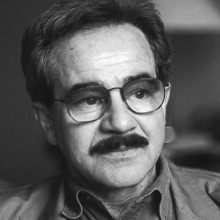Polish literature

Henryk Grynberg
A novelist and short-story writer, poet, playwright and essayist who has won many prestigious literary awards and is the author of more than twenty books, this chronicler of the fate of the Polish Jews was born in 1936.
Grynberg and his mother were the only survivors of their large family. He spent the years 1942-1944 in hiding and on "Aryan papers". After the war, he lived in Lodz and Warsaw. He became an actor in the Warsaw Yiddish Theatre company; he defected while the company was touring the US in 1967, and he has lived in the States ever since. Grynberg published his first story in 1959; it was later included in his debut collection, The "Antigone" Crew (1963). In the works that he published in Poland, as in those that he was able to publish as an emigré (without worrying about the censor), he told the stories of those who died during the war and of those who survived to live afterwards in Lodz, Warsaw, or New York, struggling to come to terms with their own memory and with the fact that others did not remember. As one of his protagonists asks: "How can people live when everything that made life worth living is dead?" This is also the principal theme of his poems, which combine to make up the long lament of a survivor who lives to cultivate the memory of those who were murdered, who becomes a "keeper of the graves" in a world infested with nihilism and materialism, a world increasingly indifferent to the fate of the victims. Grynberg makes abundant use of biographical and autobiographical material. His Jewish protagonists are usually the narrators, but their personal experiences have a metaphorical dimension and are usually supplemented by the experiences of other "survivors". Grynberg's books are short and written in a scrupulously economical language where both sarcasm and lyricism sometimes appear. Each new book is a further record of the fates of people who have been saved from oblivion by the writer, expressing the conviction that doing so is not only the duty of literature towards the victims of the Holocaust, but also a confirmation of the sanctity of human life itself.
BIBLIOGRAPHY
prose:
- Ekipa "Antygona", Warszawa: PIW, 1963.
- Żydowska wojna, Warszawa: Czytelnik 1965.
- Zwycięstwo, Paris: Instytut Literacki, 1969.
- Życie ideologiczne, London: Polonia Book Fund, 1975.
- Życie osobiste, London: Polonia Book Fund, 1979.
- Życie codzienne i artystyczne, Paris: Instytut Literacki,1980.
- Prawda nieartystyczna, Berlin: Wydawnictwo Archipelag, 1984.
- Wiersze wybrane z lat 1964-83, Warszawa: Rekontra, 1985.
- Kronika, Berlin, 1984.
- Kadisz, Kraków: Znak, 1987.
- Szkice rodzinne, Warszawa: Czytelnik, 1990.
- Dziedzictwo, London: Aneks, 1993.
- Dzieci Syjonu, Warszawa: Karta, 1994.
- Drohobycz, Drohobycz, Warszawa: W.A.B., 1997; 2003; 2012.
- Życie ideologiczne, osobiste, codzienne i artystyczne, Warszawa: Świat Książki, 1998.
- Ojczyzna, Warszawa: W.A.B., 1999.
- Memorbuch, Warszawa: W.A.B., 2000.
- Szmuglerzy, Warszawa: Twój styl, 2001.
- Uchodźcy, Warszawa: Świat Książki, 2004.
- Kalifornijski kadisz, Warszawa: Świat Książki, 2005.
- Kronika, Lublin: UMCS, 2005.
- Janek i Maria, Warszawa: Świat Książki, 2006.
- Ciąg dalszy, Warszawa: Świat Książki, 2008.
- Pamiętnik, Warszawa: Świat Książki, 2011.
- Żydowska wojna. Zwycięstwo, Warszawa: Wielka Litera, 2012.
- Monolog polsko-żydowski, Wołowiec: Czarne, 2012.
poems:
- Święto kamieni, Warszawa: PAX, 1964.
- Antynostalgia, London: Oficyna Poetów i Malarzy, 1971.
- Wiersze z Ameryki, London: Oficyna Poetów i Malarzy, 1980.
- Po zmartwychwstaniu, London: Sowula, 1982.
- Wśród nieobecnych, London: OpiM, 1983.
- Pomnik nad Potomakiem, London: OpiM, 1989.
- Wróciłem. Wiersze z lat 1964-1989, Warszawa: PIW, 1991.
- Rysuję w pamięci, Poznań: a5, 1995.
- Z Księgi Rodzaju, Warszawa: Twój Styl, 2000.
- Dowód Osobisty, Wrocław: Biuro Literackie, 2006.
TRANSLATIONS
Czech:
- Židovska valka. Vitezstvi [Żydowska wojna i Zwycięstwo], Prague: Aurora, 1996.
Dutch:
- De Joodse Oorlog [Żydowska wojna], Utrecht: Bruna & Zoon, 1968.
English:
- Child of the Shadows [Żydowska wojna], Londyn: Vallentine, Mitchell, 1969.
- The Victory [Zwycięstwo], Evanston: Northwestern University Press, 1993.
- Children of Zion [Dzieci Syjonu], Evanston: Northwestern University Press, 1997.
- The Jewish war and The victory [Żydowska wojna, Zwycięstwo], Evanston: Northwestern Univ. Press, 2001.
- Drohobycz, Drohobycz and other stories : true tales from the Holocaust and life after, New York: Penguin Books, 2002.
French:
- California Kaddish [Kadysz], trans. Małogorzata Smorąg, Paris: Edition Balland, 1991.
- La Guerre des juifs [Żydowska wojna i Zwycięstwo], trans. Laurence Dyèvre, Paris, Edition Balland, 1994.
German:
- Der jüdische Krieg [Żydowska wojna], Frankfurt a.M.: Suhrkamp, 1972.
- Kinder Zions [Dzieci Syjonu], Leipzig: Reclam, 1995.
- Kalifornisches Kaddisch [Kadisz], Frankfurt a.M.: Neue Kritik, 1993.
- Drohobycz, Drohobycz, Wiedeń: P. Zsolnay, 2000.
- Drei Erzählugen [Żydowska wojna i zwycięstwo, Ojczyzna Vera Cerny], trans. Lothar Quinkenstein, Berlin: Hentrich&Hentrich Verlag, 2016.
Hebrew:
- Hamilhama Hayehudit [Żydowska wojna], Tel Aviv: Sifriath Poalim, 1968.
- Yaldey Tsiyon [Dzieci Syjonu], Jerusalem: Yad Vashem, 1995.
- Nitsahon [Zwyciestwo], trans. Rothbard Shmuel, Yad-Vashem, Jerozolima, 2009.
Hungarian:
- Ideológiai élet [Życie ideologiczne; życie osobiste], Budapest: Múlt és Jövő, 2002.
Italian:
- La guerra degli ebrei [Żydowska wojna], Rome: Edizioni E/O, 1992.
- Ritratti di famiglia [Szkice rodzinne], Florence: Giuntina, 1994.
- La vittoria [Zwycięstwo], trans. Laura Mincer, Rzym: Lithos, 2013.
Spanish:
- Drohobycz, Drohobycz, trans. Francisco Javier Villaverde, Córdoba: El olivio azul, 2011.